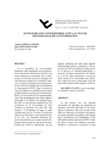Mostrar o rexistro simple do ítem
Actitud de los universitarios ante las nuevas tecnologías de la información
| dc.contributor.author | López Castedo, Antonio | |
| dc.contributor.author | Fernández Eire, Luis | |
| dc.date.accessioned | 2010-01-26T13:36:04Z | |
| dc.date.available | 2010-01-26T13:36:04Z | |
| dc.date.issued | 2007 | |
| dc.identifier.citation | Revista galego-portuguesa de Psicoloxía e Educación, 2007, 15: 105-113 ISSN 1138-1663 | es_ES |
| dc.identifier.issn | 1138-1663 | |
| dc.identifier.uri | http://hdl.handle.net/2183/7089 | |
| dc.description.abstract | [Resumen] En la actualidad las Universidades Españolas están impulsando nuevas propuestas de innovación educativa que llevan a una mejor calidad de la enseñanza. Esto se debe, en parte, al esfuerzo en pro de conseguir una convergencia europea de la enseñanza superior y, en parte, al impacto que están ejerciendo las Nuevas Tecnologías de la Información y Comunicación (NTIC). Bajo la acción de estos dos impulsos, la enseñanza universitaria se halla inmersa en un proceso de cambio profundo y de renovación de los esquemas didácticos. Esta investigación tiene como objetivo primordial el de analizar las actitudes hacia las NTIC en una muestra compuesta por 582 estudiantes de la Universidad de Vigo (Campus de Ourense). De ellos 403 eran mujeres y 179 hombres. El rango de edad oscilaba entre los 18 y 30 años. La media de edad era de 20.86 años y una desviación típica de 2.55. Los resultados obtenidos nos ponen de manifiesto que la gran mayoría afirma que Internet puede ser una fuente de información que facilita el aprendizaje, que las páginas educativas son útiles para adquirir conocimientos teóricos y prácticos y reconocen que las NTIC les permiten ser más activos en el proceso de enseñanza-aprendizaje y construir su propio conocimiento. No obstante, el 25.5% sigue prefiriendo la lectura de textos escritos a los presentados por ordenador y más de un tercio sostiene que el uso de Internet les supone mucho tiempo y esfuerzo | |
| dc.description.abstract | [Abstract] At the present time the Spanish Universities are impelling new proposals of educative innovation that take to one better quality of education. This must, in part, to the effort for obtaining an European convergence of superior education and, partly, to the impact that is exerting the New Technologies of the Information and Comunicación (NTIC). Under the action of these two impulses, university education is immersed in a process of deep change and renovation of the didactic schemes. This investigation has as objective fundamental the one to analyze the attitudes towards the NTIC in a sample composed by 582 students of the University of Vigo (Campus of Ourense). Of them 403 were women and 179 men. The age rank oscillated between the 18 and 30 years. The age average was of 20,86 years and one standard deviation of 2.55. The obtained results show to us that the great majority affirms that Internet can be a source of intelligence that facilitates the learning, that the educative pages are useful to acquire theoretical and practical knowledge and recognize that the NTIC allow them to be more active in the education- learning process and to construct their own knowledge. However, the 25,5% continue preferring the reading of texts written the presented/ displayed ones by computer and more of a third it maintains that the use of Internet supposes long time and effort to them | |
| dc.language.iso | spa | es_ES |
| dc.publisher | Universidade da Coruña | es_ES |
| dc.subject | Nuevas tecnologías | es_ES |
| dc.subject | Educación superior | es_ES |
| dc.subject | Actitudes | es_ES |
| dc.subject | New technologies | es_ES |
| dc.subject | Superior education | es_ES |
| dc.subject | Attitudes | es_ES |
| dc.title | Actitud de los universitarios ante las nuevas tecnologías de la información | es_ES |
| dc.type | info:eu-repo/semantics/article | es_ES |
| dc.rights.access | info:eu-repo/semantics/openAccess |






